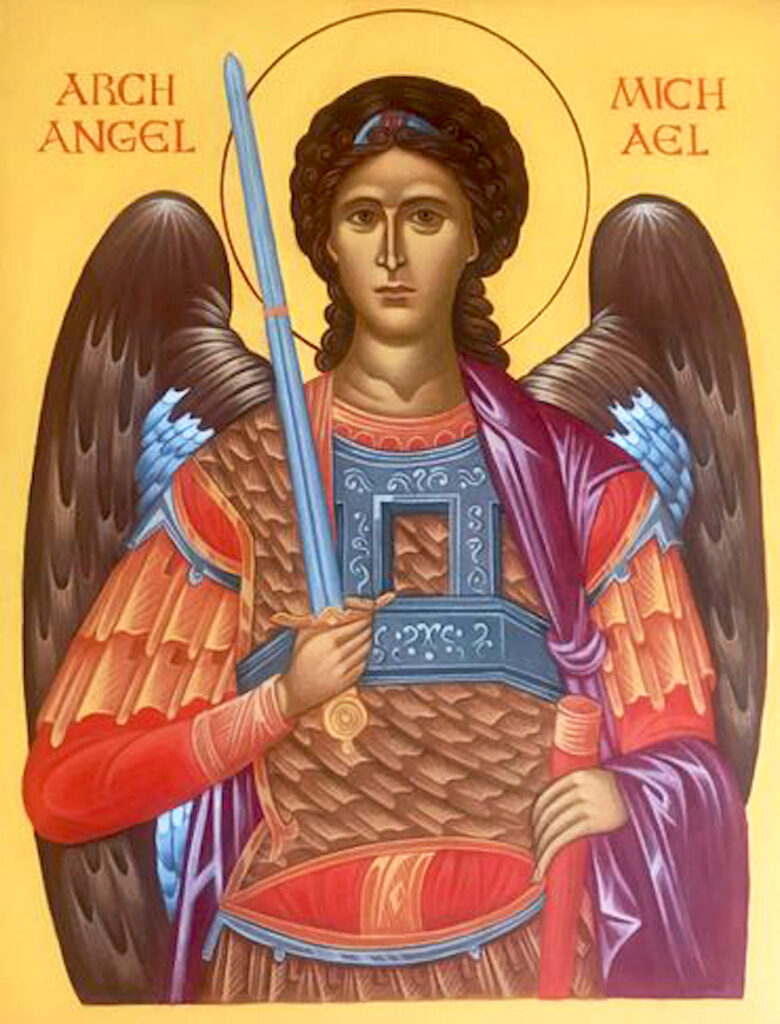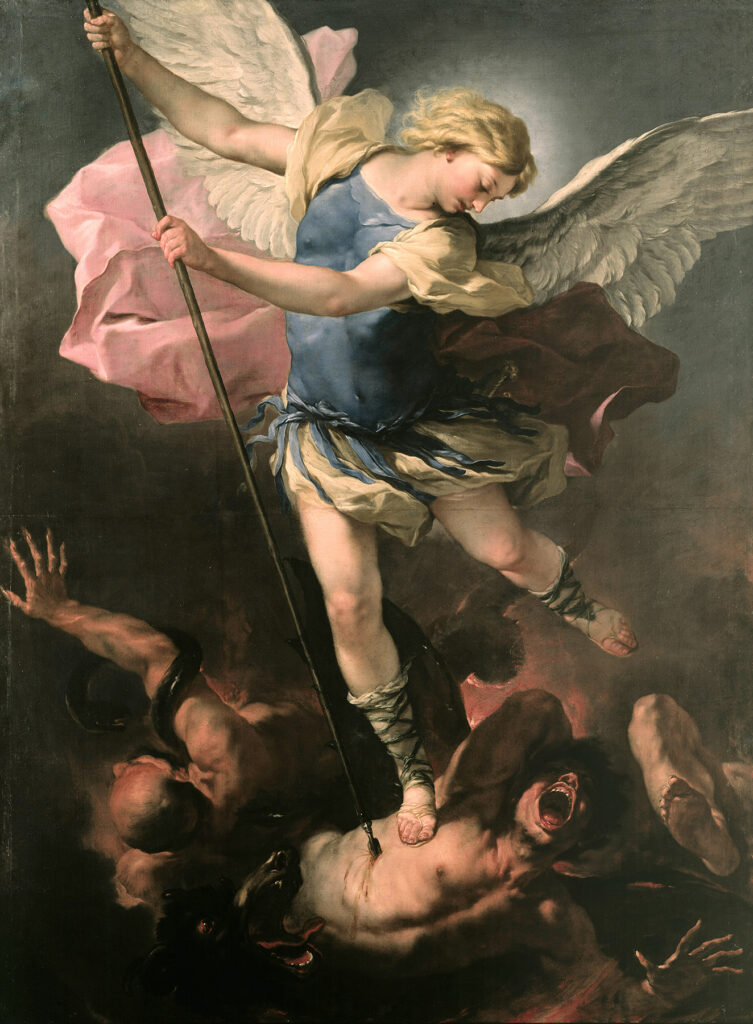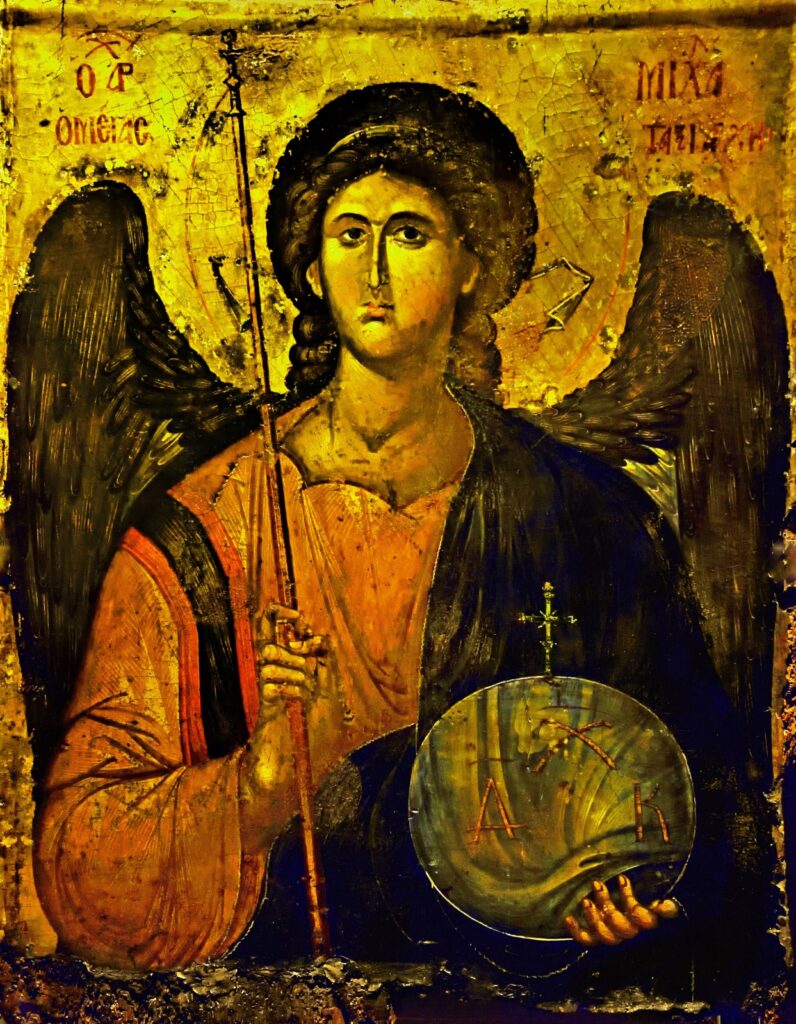Paschal M. Corby OFM Conv.
Benedicite Dominum, omnes Angeli ejus:
Potentes virtute, qui facitis verbum ejus, ad audiendam vocem sermonum ejus.
Bless the Lord, all ye His Angels:
You that are mighty in strength, and execute His word, hearkening to the voice of His orders.
So the Church prays in her Introit to the Mass of the Dedication of Saint Michael, Archangel. It recalls the integral reality of angels within our Catholic Christian faith. These angelic beings, part of God’s creation of all things, seen and unseen, who are perfect in intelligence and will, are afforded a particular participation in the life of God their Creator. They exist to give praise and honour to Him, in adoration before His heavenly throne and in fulfilling His word.
Angels, according to Tradition, are spiritual, non-corporeal beings created by God (cf. CCC, 328). While all angels are spiritual beings, not all spiritual beings are angels. As Saint Augustine reminds us, “Angel is the name of their office, not of their nature. If you seek the name of their nature, it is spirit; if you seek the name of their office, it is angel: from what they are, spirit, from what they do, angel.” (St. Augustine, En. in Ps. 103, 1, 15). Likewise, Saint Gregory the Great notes that the term ‘angel’ is applied to certain spirits according to their office as messengers of God – derived from the Greek angelos, meaning a messenger. They are messengers of the will of God to man – not as heavenly fortune-tellers, but through speaking God’s word to us, and leading us to authentic worship of Him.
Moreover, as Saint Gregory adds, those who deliver messages of lesser importance are called angels; and those who proclaim messages of supreme importance are called archangels. “And so it was that not merely an angel but the archangel Gabriel was sent to the Virgin Mary. It was only fitting that the highest angel should come to announce the greatest of all messages.”
In a few days time, September 29, the Church from ancient times, will celebrate the Feast of the Archangel Michael. The name itself means one ‘who is like God’. In his likeness to God, Saint Michael can have no part in evil. He therefore stands as one in battle with the powers of darkness. He is the antithesis of the evil One. As Saint Gregory writes: “The ancient foe desired in his pride to be like God, saying: I will ascend into heaven; I will exalt my throne above the stars of heaven; I will be like the Most High.” But between God and Satan there exists no real likeness. Indeed, how can love be in partnership with hate; truth with the lie; life with death? For that reason, Saint Michael, in his true likeness to God, does battle with the Prince of Death. The Devil might wield some power in this world, but at the end he will be destroyed. Then, he will fight with the archangel Michael, as we hear in the book of the Apocalypse:
“Now war arose in heaven, Michael and his angels fighting against the dragon; and the dragon and his angels fought, but they were defeated and there was no longer any place for them in heaven. And the great dragon was thrown down, that ancient serpent, who is called the Devil and Satan, the deceiver of the whole world—he was thrown down to the earth, and his angels were thrown down with him. And I heard a loud voice in heaven, saying, “Now the salvation and the power and the kingdom of our God and the authority of his Christ have come, for the accuser of our brethren has been thrown down, who accuses them day and night before our God. And they have conquered him by the blood of the Lamb and by the word of their testimony, for they loved not their lives even unto death. Rejoice then, O heaven and you that dwell therein!” (Rev 12:7-12 RSV)
This battle, however, is not for one time only. It is not limited to the original Fall of the angels, nor indeed to the end of time. It is a daily battle between God’s truth and the Prince of lies. And we are caught up in this cosmic battle. It is the battle for our souls, for the Church of God, for the world itself. It is therefore right and proper that we should recognize the eternal relevance of Saint Michael. In his fight against the Devil, Christian tradition has attributed to Saint Michael the role of rescuing souls from the enemy especially at the hour of death, of defending them in the judgment, of being patron of the Church militant. And it is precisely in this role of protecting the Church against Satan that Pope Leo XIII ordered the prayer to Saint Michael to be said after every Mass.

Saint Michael the Archangel, defend us in battle.
Be our safeguard against the wickedness and snares of the Devil.
May God rebuke him, we humbly pray,
and do thou, O Prince of the heavenly hosts,
by the power of God,
thrust into hell Satan, and all the evil spirits,
who prowl about the world seeking the ruin of souls. Amen.
How necessary such pray is in every age, but particularly in our own, when the smoke of Satan has not only entered into the Church, but is disfiguring its beauty and truth!
However, as the most subtle of creatures (cf. Gen 3:1), the snares of the Devil are not always obvious, disguising himself (as he is want) as an angel of light (cf. 2 Cor 11:14). And one of the ways in which he attempts to do so is by distorting and mutating the idea of ‘angels’ in the contemporary imagination. Today, through New Age spiritualities, and stripped of their biblical and theological content, the idea of an angel has become the vehicle of some anonymous life force or protection. Ladies wear them on their lapels as talisman or trinkets. Pages of popular magazines offer channels of connection with one’s angel, between Tarot readings and Astrological predictions.
It is quite clear that what we a dealing with here is something at odds with what the Church, flowing from the witness of Sacred Scripture, understands by ‘angels’. Indeed, we are confronted with a completely different order – a spiritual reality that seeks to supplant God and refuses to serve Him. For whatever leads away from the true God cannot be of God, no matter what term we give it – not an angel of light, but rather an agent of confusion and darkness.
In the midst of this confusion Saint Michael shines forth as beacon of truth, and we thank Almighty God for such a consoling gift and refuge. We show our gratitude by constantly seeking his help. But more importantly, we join him and the host of angels in giving praise to the God of life, and truth, and love, adding our Sanctus to their unending hymn of praise.



